E-letter No. 151: January 2016
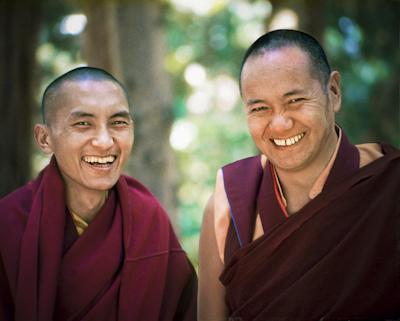
Welcome to the first eletter of 2016! We are off to a great start this year, continuing in our mission to bring you the teachings of Lama Yeshe and Lama Zopa Rinpoche in as many ways as possible.
Thank you so much to all our kind and generous supporters who helped us reach our 2015 year-end goal! We are so grateful to you for your help and will make sure that this year is especially productive and that we put your wonderful contributions to work for the benefit of all sentient beings in the way that you would wish. Read below to find links to new teachings, advices, multimedia presentations, videos, books and more.
Long life puja for Lama Zopa Rinpoche
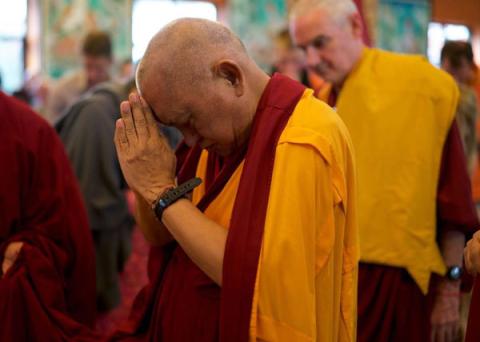
Recently we received an important message from Ven Roger Kunsang, CEO of the FPMT and Lama Zopa Rinpoche’s personal assistant. As he mentioned, it is important for Rinpoche’s students to come together to offer prayers and practices for his long and healthy life. Accordingly, a long life puja will be offered to Rinpoche at Amitabha Buddhist Centre in Singapore on Sunday, March 13. I will be attending on behalf of the Archive and three of our editors will also be there: Ven Sarah Thresher, Gordon McDougall and Sandy Smith.
LYWA has made an offering of $500 on behalf of all our staff, members, benefactors and readers dedicated to your good health and long life in addition to Rinpoche’s. Also, we have offered just over $1000 for extensive Medicine Buddha pujas to be done daily over the first 15 days of Losar for Rinpoche's long life at Drati Khangtsen, Rinpoche's house at Sera Je Monastery. Let us all rejoice at this amazing life we have and all the opportunities to benefit others it brings.
As Ven Roger requested, please participate in the long life puja in whatever way you can. You can contribute to it via the link in his message. Thank you so much.
New Title In the Bodhisattva Attitude multimedia Series
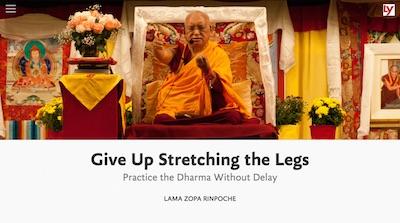
We're happy to present the third and newest title in the unfolding seven volume multimedia series based upon Lama Zopa Rinpoche's Bodhisattva Attitude. In Give Up Stretching the Legs, Lama Zopa Rinpoche gives extensive commentary on the verse sung by the dakas and dakinis to awaken the tantric yogi or yogini from sleep.
The verse’s advice is threefold:
• give up clinging to this life and being too lazy to practice Dharma;
• give up clinging to samsaric pleasures as the source of real happiness and avoid entrapment in samsara; and
• give up clinging to self-cherishing and generate the extraordinary bodhicitta motivation to achieve enlightenment to benefit all sentient beings as quickly as possible through tantric practice.
Give Up Stretching the Legs brings you into a three dimensional experience of Rinpoche’s commentary through reading, seeing and listening. We hope these multimedia experiences help you move even deeper into these dakini verses. Give Up Stretching the Legs builds upon the first two multimedia titles in this series, Everything Depends on Your Attitude and Cutting the Concept of Permanence. You can explore the growing LYWA Multimedia catalog here.
Teachings and Stories from Lama Yeshe
We have some newly-posted teachings by Lama Yeshe. The first is excerpted from a teaching by Lama Yeshe given at Chenrezig Institute, Australia, June 1976 titled Beginning to Understand Karma. The second is excerpted from a teaching given by Lama Yeshe at Istituto Lama Tzong Khapa in Italy, September 1977 titled Why We Need A Guru.
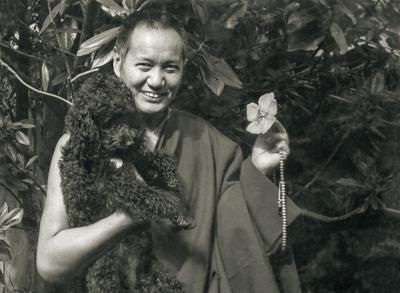
Work continues on the forthcoming book Big Love: The Life and Teachings of Lama Yeshe. This incredible book by Adele Hulse has been in the works since 1992. The most ambitious publishing project ever undertaken by the FPMT, it tells the story of Lama Yeshe’s life, Lama Zopa Rinpoche’s close association with him and the development of the FPMT. It also contains many unpublished teachings by Lama Yeshe.
This major work took eighteen years to write and has been in the editing process for about five years. We are now in the throes of photo selection. We have tens of thousands of historic photos to go through to select some 1,000 for inclusion in the book. It will probably take six to eight months to complete this and then the book will be sent to Gopa, our wonderful designer, to be laid out. Our plan is to publish the book this year in two approximately 600-page hardcover volumes in a slipcase.
Many people have contributed to this project so far and we are very grateful to you for your support. More than that, we are extremely grateful for your patience. Thank you so much.
We will keep everybody informed of progress through this monthly eletter. You can read excerpts from Big Love on our blog and see more on our Big Love web page.
Teachings and Advice from Lama Zopa Rinpoche
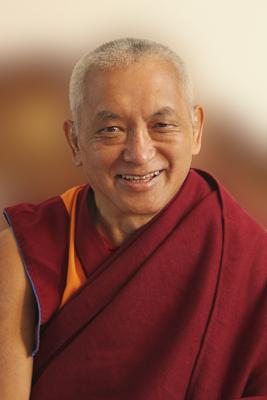
We have just posted the edited transcripts from Lama Zopa Rinpoche's teachings given in Kuala Lumpur, Malaysia in May 2006 during a seminar titled The Power of Compassion. In these teachings Rinpoche covers topics such as the drawbacks of the dissatisfied mind, the development of the compassionate mind, and offering perfect service to others. We have included an excerpt from this discourse as our monthly eletter teaching below. These transcripts accompany the series of video excerpts we posted on our YouTube channel last month.
We have also recently posted many new advices from Rinpoche on a number of topics. Highlights include:
• The Best Way to Take Care of Your Life: Rinpoche responded to a student’s request for life practices with extensive advice on topics including Highest Yoga Tantra and nyung nä. Rinpoche explained the innumerable benefits of prostration and recitation of even one OM MANI PADME HUM mantra and advised how to dedicate the merits to all sentient beings.
• Crippling Debt: A student wrote that he was in severe, crippling debt due to an outstanding loan. The situation was very worrying for him. Rinpoche advised recitation of Ganapati mantra with bodhicitta motivation and making offerings on the Buddha’s multiplying days.
• Prostration With Folded Hands: Advice to a student who was unable to do prostrations because of physical problems. He asked if he could prostrate with folded hands.
• Rejoicing in Life Practice: Rinpoche wrote this letter to a student who was close to passing from cancer. The student had written to Rinpoche about his prayers for his next rebirth.
• Parents Don’t Support Buddhism: A student was having a difficult time as her parents did not support her Buddhist practice. She asked Rinpoche about daily practices she could do to pacify the obstacles and negativities she was facing.
As always you can view all the latest advices posted on the View and Search Online Advice Book page.
The Passing of a Dear Friend of LYWA
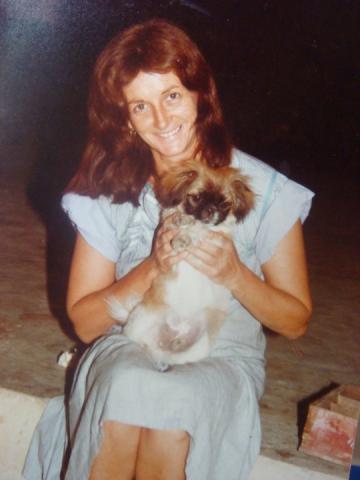
I was extremely sorry to hear of the passing of my old friend Ven. Thubten Labdron (Trisha Donnelly) last month in Australia. Ven. Labdron was a long-time student of Lama Yeshe and Lama Zopa Rinpoche, meeting the Dharma in the 1970s and offering service to the FPMT for nearly 40 years. Many of you may know her from her time as Director of Root Institute in Bodhgaya.
I met Trisha in 1978 when I moved into a house in Delhi that was being rented by mutual friends, Jamie and Isabelle Johnston. They were students of Lama Yeshe and Lama Zopa Rinpoche who were manufacturing clothes for sale in Switzerland and Trisha was their business manager. I was in New Delhi trying to get Tushita going and when our friends closed their Indian office at the end of 1978, Trisha and I teamed up to establish Tushita, which we did in 1979. We worked closely together on that for the next four years, at which point I left to take over Wisdom Publications in London.
We stayed in touch after that and worked together again between her two stints as Root Institute director, 2004–06, when she helped with preparing Rinpoche’s lamrim teachings for editing and after that checked transcripts for LYWA. In 2009 she led an expedition to Buxaduar, West Bengal, to do research for the Lama Yeshe biography, Big Love. She was preparing to work for LYWA full time again when she was diagnosed with her terminal illness, which was a devastating shock for all of us here and her friends all over the world. You can read a short obituary on the Mandala Magazine website; a full obituary will appear in the July 2016 print issue. She will be sorely missed.
Our man in India
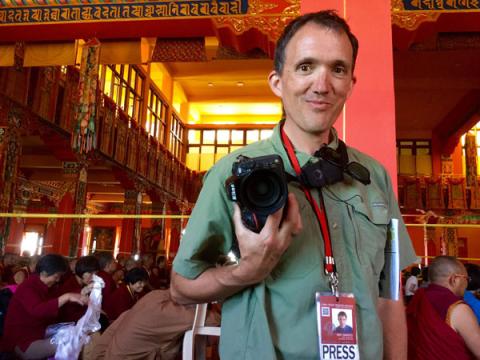
Recently we were very happy to appoint Roy Harvey as our press representative in south India for His Holiness the Dalai Lama’s December 2015 lamrim teachings. Roy is the founder of lamrim.com and has been incredibly helpful with our recent multimedia presentations. We’re all looking forward to seeing the amazing photographs he took for LYWA while he was there.
LYWA helped our friends at Kurukulla Center prepare booklets of the texts and commentaries of Nagarjuna’s A Commentary on the Awakening Mind and Praise to Satisfying Sentient Beings for the teachings with His Holiness. This booklet accompanied a request to His Holiness to give the oral transmission and commentary on these two texts during the Jangchub Lamrim teachings. Happily His Holiness accepted the request and gave these precious teachings after participants each received a copy of the booklet. You can read a detailed first-hand account from Kurukulla’s Geshe Tenley here.
Thank you all again for your wonderful support. We leave you with a teaching from Rinpoche from Malaysia in 2006.
Much love,

Nick Ribush
Director
This Month's Teaching: not one single difficulty to work for other sentient beings
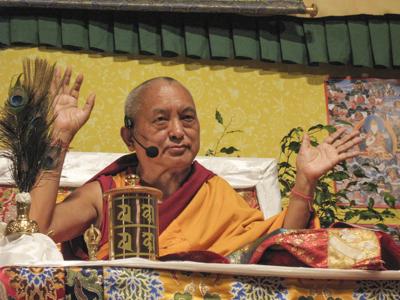
In order to develop compassion for all living beings, we need to understand all the sufferings of all the different beings in samsara, their different types of sufferings. So we have to meditate that it is all in the nature of suffering. Then we can develop compassion for every living being. Otherwise our compassion is very limited.
Our compassion is limited if it’s only for poor people, only for sick people, only for human beings who are dying. Therefore we need to learn the different types of sufferings. We need to meditate on that and then we feel it is unbearable for ourselves to experience those sufferings. When that happens to us, then we feel compassion for others.
For example, when we have AIDS, then we will feel compassion for other people who have AIDS. We feel that is so unbearable. People who have AIDS, they feel it is so unbearable that other people have AIDS. That’s because they have AIDS and they don’t want to experience that, they know about the life with AIDS.
That’s why in the stages of the path, first we have to have the realization, renunciation of samsara. Then we see the unbearable suffering of others. Then there, compassion arises. After that, great compassion, feeling how unbearable other sentient beings’ suffering is, and taking responsibility on ourselves, that we want to free them from all the suffering. That’s how compassion arises.
That leads to bodhicitta, taking responsibility, thinking, “I will do it by myself alone. I will free the sentient beings from all the suffering and causes, and bring them to ultimate happiness. Not just temporary, but ultimate happiness, especially the highest, the ultimate happiness, enlightenment. Therefore I need to be enlightened.” The bodhicitta arises like that.
By having this realization of bodhicitta, we enter the path. Then we can complete the two types of merit—the merit of wisdom and the merit of virtue—and we can achieve full enlightenment, the cessation of all the mistakes of mind, not only all the sufferings, but all the mistakes of mind. We can accomplish all that, the completion of all the qualities.
And then we’re able to do perfect work, without the slightest mistake, with no frustration, no difficulty, not one single difficulty to work for other sentient beings. Just as the sun rises—there’s one sun that rises, and the minute the sun rises, the reflection goes to every drop of water, every ocean, even the smallest water dew, a drop of water, anything that has no cover, the reflection comes immediately. How much water in the world—water dew, ocean, water spring, pond, lake—the sun’s reflection is just there. There’s no motivation for the sun, “Oh, I’m going to reflect in all this water.”
Like that, once we achieve enlightenment, then [we can do] everything simultaneously, spontaneously—working for sentient beings, benefiting others, doing service for others, without the slightest difficulties, spontaneously, without any mistake.
Therefore, we need to do meditation, together with the busy life, work. We need to do meditation, [keeping] the continuity, developing compassion, with continuity keeping the mind in that.
Also when we live the life with that mind, with that compassion, when we meditate in the morning—when we generate the motivation, the compassion, in the morning, and we do meditation on that—then we live the rest of the life with that. The rest of the day, we do things with that. That helps so much, that helps.
When we do the work with compassion, it makes so much difference in our life, like earth and sky. There is so much peace and happiness, our mind is not tight, uptight, and there is so much peace and happiness. There’s no barrier between ourselves and the other person, the other sentient being.
Because of our compassion, we feel others in our heart. We feel others are close to us. We feel that in our heart, then others also feel we’re close to them. When we feel they’re close to us, they also feel we’re close to them. So it’s like family.
Excerpted from a series of teachings given by Lama Zopa Rinpoche in Malaysia, May 2006, at a seminar titled The Power of Compassion. Read more from this teaching on our website.
